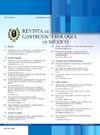Tratamiento farmacológico del síndrome de intestino irritable en México. Posicionamiento de la Asociación Mexicana de Gastroenterología 2024
IF 1.5
Q3 GASTROENTEROLOGY & HEPATOLOGY
引用次数: 0
Abstract
Introduction
The aim of this position statement is to provide health professionals with an updated and evidence-based guideline for the pharmacologic management of irritable bowel syndrome (IBS) in Mexico.
Material and methods
A literature review was conducted that included relevant guidelines and studies, up to the date of its publication. The mechanism of action, specific indications in IBS, safety profile, and availability of each therapeutic class were evaluated. The recommendations were developed by 14 experts, considering the clinical reality of IBS patients in Mexico.
Results
Specific recommendations were issued for each class. Antispasmodics (alone or combined) are used as first-line therapy for pain management, whereas antidiarrheals, such as loperamide, are used for reducing diarrhea in diarrhea-predominant IBS (IBS-D) and laxatives are used for constipation in constipation-predominant IBS (IBS-C). 5-HT4 agonists (prucalopride and mosapride) are recommended in IBS-C and 5-HT3 antagonists (ondansetron) are recommended in IBS-D. Linaclotide is the only secretagogue available in Mexico and is used in IBS-C. Rifaximin-alpha stands out for its efficacy in a subgroup of patients with IBS-D or mixed IBS. Probiotics are conditionally recommended as adjuvant therapy due to heterogeneous evidence. Neuromodulators (tricyclic antidepressants, selective serotonin reuptake inhibitors, etc.) are recommended as second-line treatment for pain management. Mesalazine can be used in IBS-D, but the corresponding evidence is weak.
Conclusion
Overall, these recommendations provide a solid framework for personalizing treatment, based on the clinical characteristics of the Mexican patient with IBS.
求助全文
约1分钟内获得全文
求助全文
来源期刊

Revista de Gastroenterologia de Mexico
GASTROENTEROLOGY & HEPATOLOGY-
CiteScore
1.60
自引率
12.50%
发文量
102
审稿时长
12 weeks
期刊介绍:
La Revista de Gastroenterología de México es el órgano oficial de la Asociación Mexicana de Gastroenterología. Sus espacios están abiertos a los miembros de la Asociación como a todo miembro de la comunidad médica que manifieste interés por utilizar este foro para publicar sus trabajos, cumpliendo con las políticas editoriales que a continuación se mencionan. El objetivo principal de la Revista de Gastroenterología de México, es publicar trabajos originales del amplio campo de la gastroenterología, así como proporcionar información actualizada y relevante para el área de la especialidad y áreas afines. Los trabajos científicos incluyen las áreas de Gastroenterología clínica, endoscópica, quirúrgica y pediátrica.
 求助内容:
求助内容: 应助结果提醒方式:
应助结果提醒方式:


